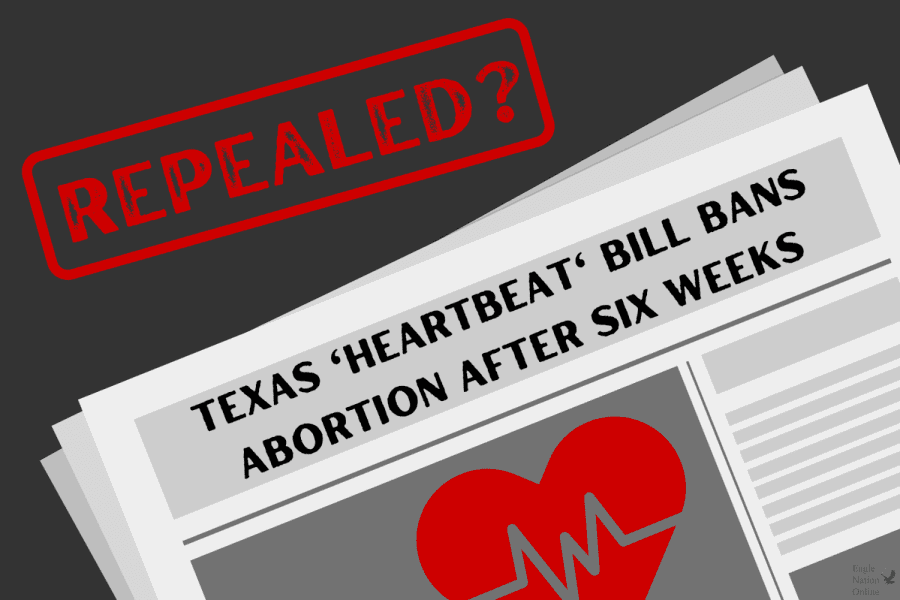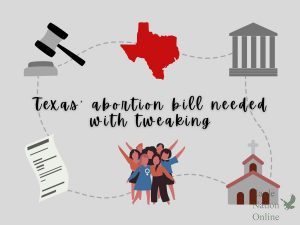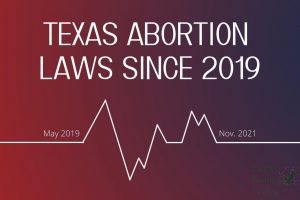Opinion: Texas’ ‘heartbeat’ bill must be repealed, Roe v. Wade protected
In a graphic by journalist Morgan Reese, a newspaper reads: “Texas ‘heartbeat’ bill bans abortion after six weeks.” On May 19, 2021, Texas Governor Greg Abbott signed Senate Bill 8, banning abortions after six weeks of gestation. “Abortion is healthcare,” Reese said. “All women should have access to safe abortions and control of their medical decisions and bodies, as decided in Roe v. Wade. Senate Bill 8 only increases the likelihood of unsafe abortions, maternal fatalities and an increasingly overwhelmed foster system.”
December 3, 2021
Texas Governor Greg Abbott signed Senate Bill 8, the “Heartbeat Bill,” into law on May 19, prohibiting abortions at six weeks of gestation. This law is a direct violation of the Roe v. Wade Supreme Court case, which is typically used as a precedent for cases and laws regarding reproductive rights. Now, other states like Mississippi have passed laws banning abortion earlier than stated in Roe v. Wade. The Supreme Court of the United States examined Mississippi’s 15-week abortion ban Dec. 1, and their position thus far leans toward an overturn of Roe v. Wade.
Abortion is healthcare. All women should have access to safe abortions and control of their medical decisions and bodies, as decided in Roe v. Wade. Senate Bill 8 only increases the likelihood of unsafe abortions, maternal fatalities and an increasingly overwhelmed foster system.
Abortion laws are ineffective
One of the pivotal reasons women get abortions is because their pregnancy or life is in jeopardy, and many women will resort to an unsafe “under-the-table” abortion when access is restricted. In Margaret Wurth’s 2019 article from “The Progressive,” she states that the Center for Disease Control and Prevention released data revealing that hundreds of women die from preventable complications during pregnancy. Many abortions happen due to complications during pregnancy that may be fatal to the mother or the fetus, and banning abortions only increases the rate of these preventable deaths from pregnancy complications and unsafe abortions.
Bills restricting abortion have been proven ineffective, as they do not reduce the rate of abortion. According to the Guttmacher Institute, a reproductive rights research organization, annual fact report from 2020, the rates of abortion in countries where it is legal versus outlawed are very similar. Abortions will happen regardless of the law, as they are an integral part of women’s reproductive healthcare, and a ban only increases abortions happening unsafely. Currently, a woman can go out of state to receive an abortion, but it can be expensive and take more time than the woman has in the case of a fatal complication. While there are exemptions for women whose life is in danger, some situations can be time-sensitive, and going through the process of receiving an exemption may not be a time-safe option. Banning abortions is harmful to these women whose lives would be saved by an abortion.
Foster care is not a solution
The current foster care system in Texas is overwhelmed, with the number of children increasing tenfold from the number last year. Thousands of children have spent time at unlicensed placements due to the great number of foster children entering the system. In 2021, the number of children at unlicensed placements like churches, offices or hotels rose from 148 to 415 in six months, not counting the children who were placed in-between. An article from the Texas Tribune said that before 2021, these numbers stayed under 100. At these placements, children can experience sexual abuse, commit self-harming actions and receive improper medication dosages, according to the Texas Tribune, and most children spend an average of two weeks in these dangerous places.
The current foster care system is not in a stable place to be a primary solution for the mothers that cannot care for the children that they were forced to birth. If this ban is in the best interest of the women and children of the state and must be instituted, fixing the foster system by implementing more licensed facilities and staff must be done first for the safety and futures of all the children.
Religious versus scientific reasoning, the separation of church and state
The main advocates for abortion laws come from the country’s Christian majority, yet one of the founding proclamations of our country is to maintain separation of church and state. The establishment clause of the first amendment states that no laws can be made “which aid one religion, aid all religions, or prefer one religion over another.” Many supporters of the law’s reasoning are based on verses from the Bible, like Jeremiah 1:4-5. A law should not be made based on a religious belief to maintain separation from church and state, as stated in the Constitution.
The New International Version of the Bible’s Jeremiah 1:4-5 states, “Before I formed you in the womb I knew you, before you were born I set you apart; I appointed you as a prophet to the nations.” Believing this verse to be a solidification of life beginning at conception is a stretch, as this verse was directed at Jeremiah about his position as a prophet, not the general populous. The verse does not state that a fetus is alive once first placed in the womb, only that in the Christian belief a soul has a set purpose unknown to man before conception.
This idea of being alive is based on a spiritual belief, not the science of a fetus being a conscious human. An article from Scientific American says conscious, meaning one has an awareness of life, requires “a sophisticated network of highly interconnected components, nerve cells,” which do not form until 24 to 28 weeks. Two months later, “synchrony of the electroencephalographic (EEG) rhythm” connects the hemispheres of the brain and signals full consciousness. Senate Bill 8 prevents abortion from six weeks. This is before the fetus even has nerve cells to process surroundings and have a conscious awareness of life. If this law were to be in place, the restriction being put in place this early, before most women even know they are pregnant or have missed a menstrual period, is ridiculous, as the fetus is not yet aware.
The namesake of the “Heartbeat Bill” comes from the belief that the fetus is alive at around six weeks, as a heartbeat can be heard. Live Science says that this heartbeat is actually merely a flutter from the place where the heart will eventually develop throughout the first trimester, and can not be heard with a stethoscope, only advanced ultrasound technology. In addition, this flutter existing does not determine if the fetus will develop a viable heart.
Conclusion
If Senate Bill 8 is to stay or Roe v. Wade is repealed, a solution must be found for the foster care system overpopulation and easily accessible exceptions to situations like rape, incest and unviable pregnancies must be set.
Despite the law, abortion will always be a vital aspect of healthcare.





















Rett Rizzo • Dec 5, 2021 at 3:04 pm
I would disagree that the pro life view is purely or even mostly a religious view. I think its a scientific and moral view.
Some people think that the question on when life begins is unsettled, but I dont think thats the case. Overall, 95% of biologist agree that human life begins at conception. 70-90% of self identified pro choice biologist say they agreed with the statement human life begins at conception. https://papers.ssrn.com/sol3/papers.cfm?abstract_id=3211703
So if we are to focus on the science, and where it leads us, then we must conclude that human life begins at conception.
I think its also fair to say that a fetus is innocent. You would be very hard pressed to find a way to say that a fetus would not be innocent.
So we are left with one question, is it wrong to take a innocent human life. Pro life people would say absolutely, thats wrong. But the pro choice position can not say the same thing while supporting abortion.
The pro life position is the only scientific and moral position to hold.
Rett Rizzo • Dec 5, 2021 at 2:44 pm
Im curious, where did you get the information that “one of the main reasons women get abortion is because their pregnancy or life is endanger”. This dosent seem to be based on any scientific measure, actually quite the opposite. “High risk” pregnancies account for only 6-8% of all pregnancies, much less abortions. And high risk just means in need of carefull attention, and only in very rare cases are those high risk pregnancies life threatening. Former surgeon general Everett kropp stated that “ The fact of the matter is that abortion as a necessity to save the life of the mother is so rare as to be nonexistent.” So on what basis do you say this is a “main reason”, as it appears to be almost negligible. It seems like pure conjecture to me. https://colfsclinic.org/high-risk-pregnancies/
Morgan Reese • Dec 6, 2021 at 12:24 pm
Hello,
Thank you so much for reading my article and leaving a comment!
My mother is a nurse in a high risk pregnancy unit at a hospital, so my reasoning for using that statement as my topic sentence comes from her experiences. High risk pregnancies can be very dangerous, and the occupancy and experiences of my mother’s unit can vouch for that statement. She has had patients dangerously have to travel to different states for abortions in a time crunch under this law.
While I am aware it is not the primary reason as to why women get abortions, it is one of primary, main import. It is a monumental reason as to why Roe v. Wade must be protected.
I appreciate your comment and the opportunity for respectful discussion.
Thank you,
Morgan Reese